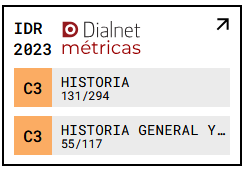El pósito de Santo Domingo (1579-1699)
DOI:
https://doi.org/10.18172/brocar.1787Abstract
"Pósitos" were, during Modern Age, a key piece in municipal economic policy, not only in arder to warrant customers food-supply of a basic product, bread, but to serve as an instrument for local elites in their own interest. It was in economic control where the castillian villages and towns kept more autonomy in the "Century of Absolutism". According to such autonomy, public granaries showed a great capacity to fit the diferent caracterists of each population, depending of severa/ factors such as the importance of wheat production, the degree of specialization, the size of population or the concentration of power in a few hands, among others. In Santo Domingo de la Calzada can be seen how a management model not well adapted change in the last years of 16th Century, in the context of crisis produced by pest of 1599, to become a efficient tool in the second half of 17th Century.Downloads
Download data is not yet available.
Downloads
Published
1994-06-28
How to Cite
Torrealba Domínguez, J. G. (1994). El pósito de Santo Domingo (1579-1699). Brocar. Cuadernos De Investigación Histórica, (18), 223–250. https://doi.org/10.18172/brocar.1787
Issue
Section
Articles
License
The authors retain copyright of articles and authorize CIF the first publication. They are free to share and redistribute the article without obtaining permission from the publisher as long as they give appropriate credit to the editor and the journal.
Self-archiving is allowed too. In fact, it is recommendable to deposit a PDF version of the paper in academic and/or institutional repositories.
It is recommended to include the DOI number.
This journal is licensed under a Creative Commons Attribution 4.0 International License











